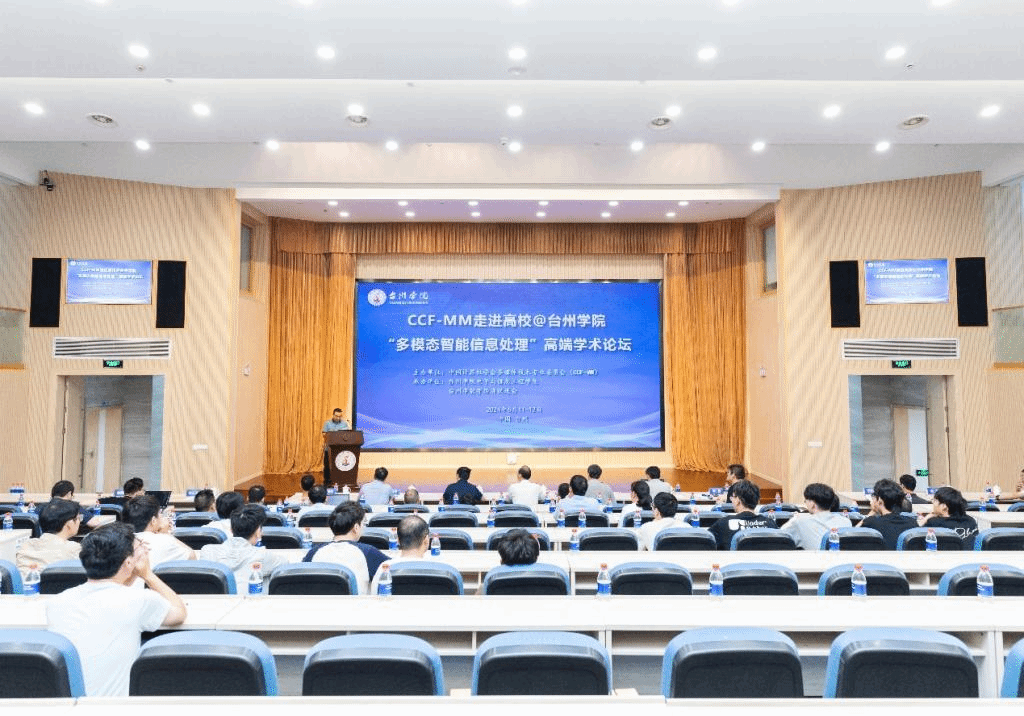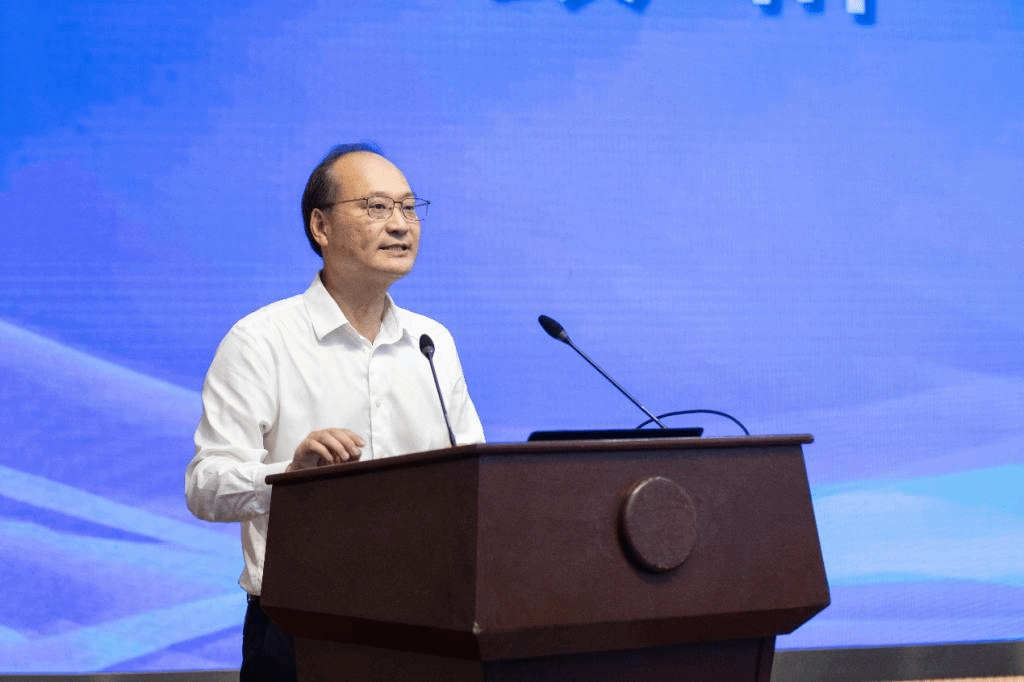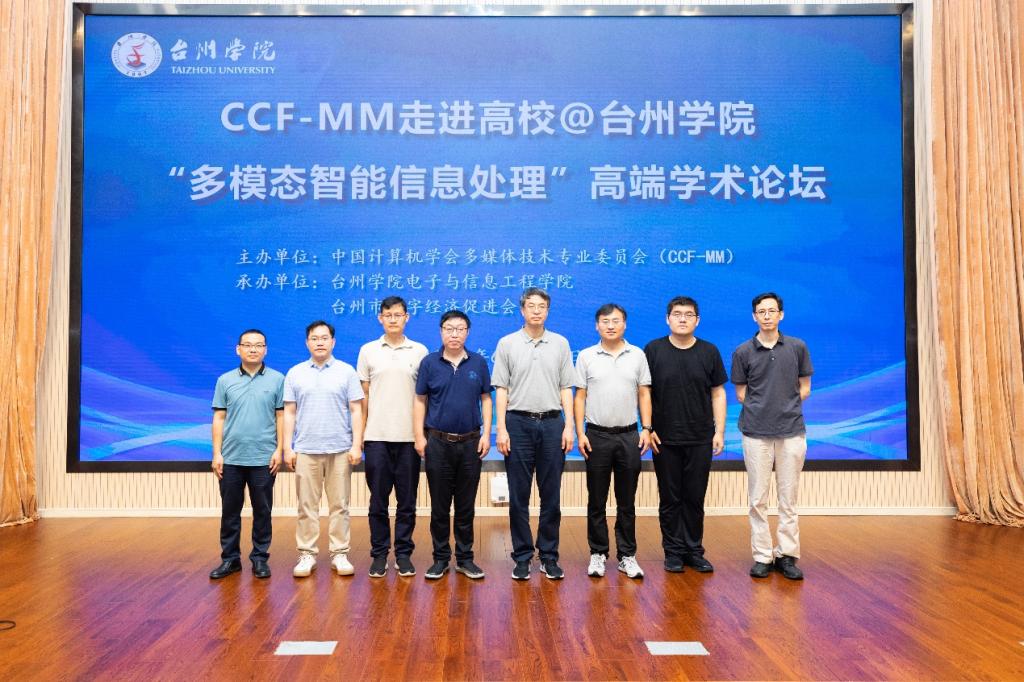
“Multimodal Intelligent Information Processing” Academic Forum was successfully held in the International Conference Hall on Jiaojiang Campus of TU from June 11th to 12th. The forum was organized by the Multimedia Technology Committee of China Computer Federation (CCF-MM) and hosted by TU’s School of Electronic and Information Engineering and Taizhou Digital Economy Promotion Association. Han Deman, Vice President, and Zhao Xiaoming, former Vice President, attended the meeting. Zhang Shiqing, Dean of the School of Electronic and Information Engineering, was the chairman of the forum and presided over the meeting. More than 90 delegates from Taizhou Economic and Information Technology Bureau, Taizhou City Informatization Promotion Association, and the business community attended the meeting.

Han Deman made an opening speech. He congratulated the successful holding of this high-end academic forum, warmly welcomed the experts and scholars attending the forum, expressed sincere greetings to all the representatives, and briefly introduced the relevant policies of Taizhou City for the development of digital economy as well as the university’s scientific research and talent cultivation. Han said that artificial intelligence and big data technology represented by deep learning has brought great changes to many fields. With the development of big language modeling technology, the performance of artificial intelligence systems has been significantly improved. Research in the field of artificial intelligence has also evolved from uni-modal intelligence, such as speech, text, and vision, to multi-modal fusion. As an emerging research field, multi-modal intelligent information processing is attracting an increasing amount of attention. Meanwhile, he hoped that experts and scholars would often come to visit TU and exchange ideas, guide the construction and development of related disciplines and specialties, and pass on their experiences, so as to jointly help with the iteration of disciplines and industrial upgrading.

Zhu Wenwu, ACM/IEEE/AAAS/SPIE Fellow, Foreign Member of the European Academy of Sciences, and Professor of Tsinghua University, Chen Enhong, IEEE/CCF/CAAI Fellow, National Outstanding Young Scientist Fund Recipient, and Professor of University of Science and Technology of China, Ma Siwei, IEEE Fellow, National Outstanding Youth Fund Recipient, and Boya Distinguished Professor of Peking University, Jiang Shuqiang, National Outstanding Young Scientist Fund Recipient and Researcher of Institute of Computing, Chinese Academy of Sciences, He Lianghua, Yangtze River Scholar of Ministry of Education and professor of Tongji University, Li Xi, National Outstanding Young Scientist Fund Recipient and Distinguished Professor of Zhejiang University, and Wang Yaowei, Yangtze River Scholar of Ministry of Education and Researcher of Pangcheng Laboratory, attended the forum. Jiang Shuqiang, Deputy Director of the Multimedia Technology Committee, made a brief introduction of this event and the history of the committee, and welcomed teachers and students to join the committee and participate in the activities of the committee.
After the opening ceremony, Prof. Zhu Wenwu from Tsinghua University gave a keynote speech entitled “Generative AI Research in Dynamic Open Environment”. The report firstly discussed the key issues of generative AI research in dynamic open environments, which was followed by the proposition to realize the external generalization ability of generative AI models through decoupled learning, and the illustration about the future research direction of generative AI.
Prof. Ma Siwei from Peking University, with the theme of “Generative Image and Video Coding”, discussed the important progress of multi-modal large model technology in generative coding, and introduced his team’s explorations in generative coding of images and videos, as well as the challenges of future development.
Prof. He Lianghua from Tongji University introduced the latest progress in the field of “Intelligent Analysis of Medical Images”. Aiming at the characteristics of multi-modal image acquisition, histological image analysis, and intelligent image modeling, he introduced the relevant medical image analysis models in terms of the challenges of large image deformation, small samples, and interpretable images, as well as the dynamic on-demand visualization platform for prostate tumor images. He also introduced part of the work of the dynamic on-demand visualization platform for prostate tumor images.
Focusing on “multi-modal visual structure learning”, Prof. Li Xi from Zhejiang University analyzed the data-driven AI learning methods from the multi-dimensional perspectives of target visual perceptual properties, visual feature expression, deep learner construction mechanism, and high-level semantic comprehension, and introduced a series of representative work done by his team in recent years on visual semantic analysis and comprehension using feature learning. He also introduced a series of representative research work done by his team in recent years using feature learning for visual semantic analysis and understanding, as well as its practical applications.
This academic forum provided an interactive communication platform for the field of multimedia and artificial intelligence, shared the latest scientific research and technological application results in the field of multi-modal intelligent information processing, enabled participants to understand the most cutting-edge academic and industrial application dynamics, and promoted the communication and cooperation among peers.